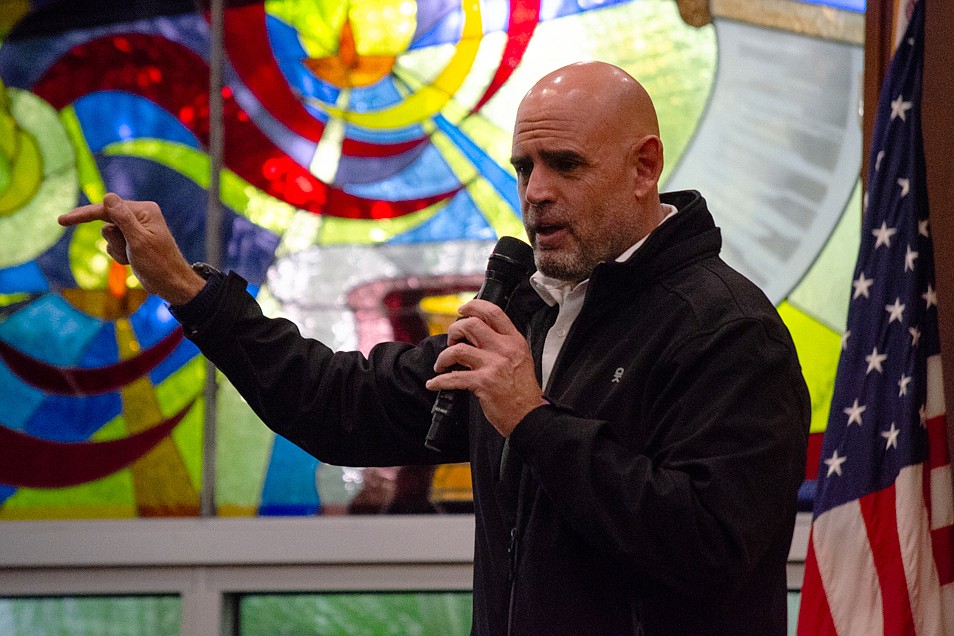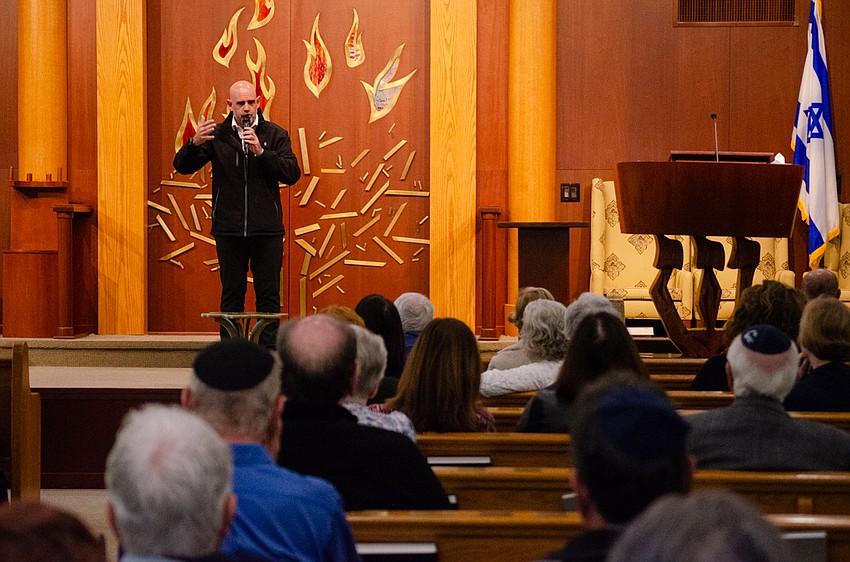- May 6, 2025
-
-
Loading

Loading

Many Jews have their own personal antisemitism story.
My dad had one in the 1980s that I recall vividly even some 40 years later. He was working his second job — his first was being a sixth grade teacher in Queens, New York — as a waiter at Howard Johnson’s on Long Island. A big group of people came into the restaurant late one Friday night, and a fellow waiter said to my dad “Damn Jews. Hitler didn’t get them all.”
My dad, Jerry, froze for a second. Then, as he has told me, in one of those rare moments where you think of the just-right comeback at the just-right moment, my dad said back to the other guy: “Yeah, he didn’t get me either.”
I’ve thought about that story on and off for years. It’s both jarring and inspiring. People can be cruel. People can be ignorant. But sometimes you have to fight back. Even if it’s a put-them-in-their-place comeback.
This is my fight-back moment.
The past two months — ever since the brutal attack Hamas unleashed on Israel on Oct. 7 — have been emotionally challenging for me. Heartbreaking. Frustrating. Difficult.
My day job is the managing editor of the Business Observer, sister publication of YourObserver.com. We write about companies and entrepreneurs, breaking business news, how government intersects with business, etc. We don’t take political sides. Except for the columns from our founder and owner, Matt Walsh, we don’t do opinion journalism. I have plenty of opinions — just ask my 15-year-old son who sometimes calls me the "mayor of get off my lawn city" — but I don’t publish them.
And despite the raw emotions I felt — and still feel — from what happened Oct. 7, I didn’t think or expect to write this column. But a speaker I heard recently made me realize I have to.
It’s not that I’m not proud of being Jewish. I am. For many reasons — despite all the times I tried to wiggle out of going to Hebrew School growing up. (Sorry, Mom and Dad.)
I celebrate all the big holidays, some of the smaller ones and sometimes celebrate Shabbat (more often when I’m with my sister, her husband and their kids). I read “The Diary of Anne Frank” in middle school, “Night” by Elie Wiesel in college. I’ve seen “Fiddler on the Roof” on Broadway. Twice.
My son’s bar mitzvah in October 2021, a Jewish coming-of-age ceremony, was one of the proudest moments of my life. Ditto for my wife, Elyse, also a proud Jew. (Elyse is my Beshert: Yiddish for soulmate or destiny.)
Team Gordon loves being Jewish, and we love being Jewish in Sarasota and Bradenton. My wife is on the board of our synagogue, Temple Sinai; our son is a volunteer at the religious school there; and I’ve been on the board of Jewish Family and Children’s Services in Sarasota for three years.
I’ve also long been a big defender and supporter of Israel. I have never been there (I turn 50 next year, and I’ve thought for a few years that would be the ultimate birthday present), but its significance — of religious freedom and constantly overcoming obstacles and enemies — to the Jewish people has never been lost on me.
One more pro-Israel nugget: The post World War II formation of Israel, while it can take books to explain, can also be summed up in two words: never again. After the Holocaust, when 6 million Jews were murdered by the hands of Nazi Germany — 6 million women, men and children — the world, or at least a lot of it, understood what that meant. It meant never again will the world standby while terrorists attempt to annihilate Jews from the earth.
With that as a backdrop, I’ve been thinking, marinating, the past two months: Should I write something about what the Hamas attacks and Israel’s war to defend itself means to me? And what would I say?
Then, on Nov. 29, I met Maor Elbaz-Starinsky. He’s the Consul General of Israel in Miami. He’s been a diplomat since 2006. But years before that, like every other young Israeli, he was in the the Israel Defense Forces, the country’s military. He was a commander in the IDF’s paratroopers unit.
Elbaz-Starinsky spoke with Sarasota-area reporters in a closed-door session at the Jewish Federation of Sarasota-Manatee that included never-before-seen videos of Hamas atrocities Oct. 7. The videos were horrifically graphic. They were also brutally clarifying. Why? It was good versus evil in its rawest form.
Just as clarifying was a conversation I had with Elbaz-Starinsky before the video. I told him I had been hesitant to come to the debriefing. I had been struggling enough with what I had seen and watched and read in the news. The words of my wife — you can never unsee what you will see — were paramount in my mind.
But Elbaz-Starinsky, traveling across Florida to speak to Jewish organizations about what happened and what's happening now in Israel, said something pretty meaningful. “When this first happened, I wanted to look away,” he said. “I look like a tough guy, but I’m really not. I wanted to look away and not see this, but people need to see this. People need to see through the lies. You can’t get your news on this on a five-second TikTok clip.”
Elbaz-Starinsky had a lot of other things to say. I found myself nodding in agreement in my mind as he spoke. A sampling of his comments includes:
The brutality: “This was an unprecedented attack in a ruthless, brutal way. I don’t say this word a lot, but this was like Nazi death camps. This was done just like in Holocaust days. The Nazis even tried to hide what they did. Hamas is proud of it.”
The timing: “They came to Israel on a Saturday, on Shabbat. Happy times. And they murdered, slaughtered, brutalized and raped people.”
The difference between Israel defending itself and the plight of Palestinians under Hamas: “This isn’t a war against Palestinians. This is a fight between good and evil. This is a fight between light and darkness. If you think there is moral equivalence here, you are wrong. This is not about politics.”

Anti-Israel protests in big cities and college campuses: “People (on college campuses) are defending lies. They are saying evil things and supporting evil. There is no other way to say it when you say things like ‘from the river to the sea.’” ("From the river to the sea" is a catch-all phrase that, according to the American Jewish Committee, symbolizes Palestinian control over the entire territory of Israel’s borders, from the Jordan River to the Mediterranean Sea. The line after sea is “Palestine will be free.” In other words: the end of Israel.)
The fallacy of a cease-fire: “There was a cease-fire. That was on Oct. 6. It meant nothing. Israel hasn’t been in Gaza since 2005. The Hamas charter calls for the destruction of the state of Israel — and they are doing everything they can to achieve that goal.”
One last quote from Elbaz-Starinsky succinctly sums up my why — why I wrote this, why I want Israel to keep going, keep fighting. And why it’s important for non-Jews to understand the personal nature of this attack and why it threatens our religion, our culture and our community. It’s why I'm asking people to stand with Israel.
“We are doing everything we can,” Elbaz-Starinsky said, “to make sure the words never again aren’t empty.”